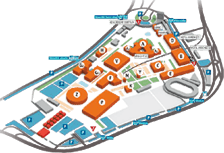TECHAGRO
7.-11.4. 2024
International Fair of Agricultural Machinery

Behind Hall Z visitors will see demonstrations of crushers, grinders and other machinery for the handling of bulk wood material
BIOMASA will introduce a large number of machines for the processing of wood mass in operation. Stanislav Václavek, expert on biomass and director of DŘEVO-PRODUKT SV, gave us the details of the BIOMASA trade fair as well as its supporting programme.
Part
of BIOMASA will be once again practical demonstrations of biomass processing technologies.
What will be on display behind Hall Z?
Visitors
will find even more practical outdoor demonstrations behind Hall Z than in
2012. There will be at least ten companies that will participate in the programme;
they are world leading manufacturers of wood chippers, crushers and technology for
loading and sorting of bulk wood material. For those who are interested in buying
some of these technologies it will be a place with a high concentration of
representatives of the major brands. The general public has no idea that “something
like this” produces “something for heating”. And one of these “somethings” is, for
example, a wood chipper which can produce “something for heating” in the amount
of 24 tons per hour. The “something for heating” is the cheapest fuel on the
market. It is great that at the exhibition visitors will see things that they
cannot see elsewhere.
The
exhibitors’ displays will be situated in one place this year, in Hall Z
together with the Silva Regina fair. Do you think it is an appropriate combination?
I am sure
it is. Exhibitors at BIOMASA are naturally present in more branches, not only in
forestry. It must be said, however, that forestry together with agriculture are
sectors frequently associated with the topic of biomass use for energy
purposes. Many farmers are also foresters who take care of their forests or
hunters. Therefore, displays of exhibitors associated with the agricultural
biomass will be in their “home” environment and atmosphere. The location is
certainly appropriate.
Another
important part of the exhibition is a lecture forum. What will be the main
topics in the use of forest biomass?
We choose
such lecture topics which are on demand in our opinion. The key topics for this
year are Use of wood mass energy, Biogas, Biogenic motor fuels, Circulation of
matter, nutrients and energy.
Personally, I am preparing lectures on the Use of wood mass energy. I would like to invite all who are interested in the topics of “exploitation of remains in the forest”, “firewood”, “wood and plant pellets”, “wood, pellets, wood chips boilers”, “economy of heating with wood”, “chipping and chopping machines”, “fast-growing woods”, etc. The programme of lectures will be posted on the BVV website.
The aim of the lectures is to raise awareness of biomass use among the population. Information about wood chips is an example of such dissemination. People believe that those who use chips for heating need to stack “heaps” of chips and this is where a negative barrier is created. However, as soon as they find out that for a 70 KW boiler they need 30 tons of chips for the season, they are surprised by how small the amount is. This is an amount that they are able to imagine (in unchipped condition it is one to two trucks of timber).
Forest
biomass is your specialisation. What do you think we can expect in the use of forest
renewable sources in the Czech Republic? (Are we at the beginning of massive
development in the use of this source or is it going to be a slight gradual
increase?)
The
lignocellulosic forest biomass is being used nowadays but still I can see room
for its further development. It is important to understand that all of today’s
fuels consist of an energy mix; each of them has its pros and cons and they
should be used by society accordingly.
Being an optimist I believe that everything will eventually settle down in a logical way. In the Czech Republic the forest biomass has been tested in many ways, so it would be incorrect to say that we are at the beginning. However, many things are evolving and biomass is more and more directed to its regional nature. Nature distributed it throughout our country so that people in the regions be able to consume it reasonably. Fossil fuels, such as coal, oil and gas, are not as well distributed as biomass; therefore we are forced to transport it to the place of consumption. But it would be pointless to transport something (meaning biomass) that is already available at the “the place of consumption” to another place. Economically speaking, this fuel is being burdened with additional costs. This philosophy is particularly true in forestry because this is where every penny counts. Besides, forest biomass gives people jobs and it is a raw material (fuel) that we do not have to import from abroad. At the same time it is the cheapest fuel on the market and technologies for ecological energy extraction are available. Of course I should add that its volume is limited.
Who
is and who will be the key consumers of forest biomass? Are they households
that buy biomass boilers or rather municipalities and regions?
Both households
and municipalities and regions are the consumers of forest biomass. For
example, households are major users of firewood, owners of larger boilers use
wood chips. Using wood pellets is also expanding, mostly in households. A lot
of household furnaces are filled manually. Larger boiler plants need fully automatic
boilers.



